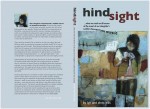Hindsight – a book by parents for parents
Hindsight – a book by parents for parents

Devoted parents, Lyn and Chris Ellis, have written Hindsight so that others may benefit from their experience of caring for a child with anorexia.
The love and care of parents for children who develop an eating disorder knows no bounds. For some, like Lyn and Chris Ellis, helping their child recover is not enough. They want their experience to ease and speed the way through the darkness of the eating disorder for other parents who find themselves confronting this scary and challenging illness. Lyn and Chris were shocked to learn their older daughter was suffering from anorexia. They did not know where to turn. The loss of valuable early intervention opportunity fanned the illness, allowing it to develop and behave like a wildfire in the mind of their beautiful child. I met Lyn at the 2011 NEDA Conference in Hollywood, and she was passionate about doing what she could to help other parents. The result is Hindsight – a book which Lyn and her husband Chris wish they had access to at the onset of their daughter’s sudden descent into anorexia. Lyn and Chris explain why:
The motive behind writing and publishing Hindsight is simple: It’s the book we wish had been available when we were blindsided by our daughter’s anorexia in December 2009.
At the time, we knew nothing about anorexia nervosa. (We didn’t even know that it’s a mental disorder—one that kills more victims every year than any other mental illness!) We had no idea what we were up against, or how much we would have to learn—and learn in a hurry, because beating anorexia can be a race against time.
When we recognized that we had a serious problem on our hands, we sprang into action by searching the Internet, contacting friends and reaching out to any resource we could find. And we read books—more than 50 in the first six months. Gradually, we gained knowledge and made connections—but not fast enough to equal the speed with which our daughter’s health was spiraling downward.
Along the way, vital assessments and decisions had to be made about treatment teams and methods, qualifications of the professionals we encountered, appropriate levels of care at different stages of the disorder, and a host of logistical questions (not the least of which was how were we going to pay for the care she needed). It took a lot of time and many missteps before we even knew what questions to ask.
Looking back, we can’t help wondering how things would have gone better for her (and for us) if we had known then what we know now. What agony could have been avoided or lessened? Which of our choices may have inadvertently prolonged the illness? (It is known that the faster and more aggressively one treats this illness, the better the chances for full recovery.) If our daughter is unable to permanently overcome her anorexia, is it at least partly because of the choices we made when we didn’t know enough, in spite of our best efforts and intentions?
We certainly don’t feel that most of the treatment teams were aggressive enough during critical phases, in spite of our constantly imploring them to do more. Most were annoyed with or disdainful of our involvement, viewing it as an intrusion into their professional territory. Our frustration with them and the roadblocks we encountered—and their displeasure with our involvement—prompted them to perform what is known as a “parentectomy”— in which we were excluded from providing or receiving information about her health or care. In effect, they colluded with our daughter’s illness. They said this was essential for her recovery, but we felt they were being manipulated by the illness. She was extremely angry with us for “interfering” with her “right” to be skinny, and they saw her anger as a response to our interfering with her process of individuating and growing up. And, thanks to HIPAA privacy laws, we had no legal basis on which to fight that exclusion.
If we’d had more information about the various modes of treatment, if we’d realized that many so-called ED professionals don’t incorporate research findings into their treatment protocols, and if we’d understood the nature of loopholes in this illness, we would not have entrusted our daughter’s care to others so blindly. We would have known the importance of interviewing providers until we found one who understands the need to close loopholes (not create them), and who will align with parents against the illness rather than colluding with the illness to keep parents at bay.
We would have known to ask professionals whether they base their treatment strategy on recent research results, because we found out too late that many of them rely on theories postulated before brain and genetic research data became available, and before various treatment modalities could be compared for effectiveness. We would have known to discuss the providers’ willingness to modify their operating paradigm to incorporate recently gained knowledge in the field, because the clients of those who base their treatment on recent research have a much higher rate of recovery.

My Kid is Back - Empowering Parents to Beat Anorexia Nervosa - by June Alexander with Daniel Le Grange - explains the Maudsley method.
This book explains what the illness is; how theories about it have changed over time (as new technologies have allowed us to see how the brain functions); the levels of treatment and common treatment modalities (the newest and most promising of which is the Maudsley method – see My Kid is Back); how to navigate the insurance thicket; and where to find the resources and support to empower loved ones to face the complex, surreal world of anorexia with courage, patience and perseverance.
Click here to order your copy of Hindsight.






